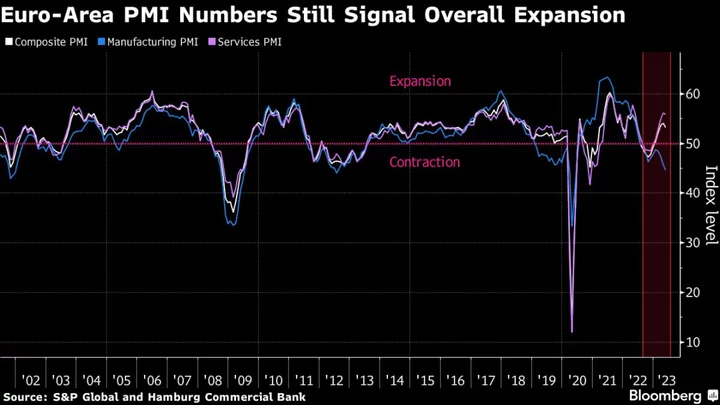Euro-zone manufacturing activity shrank this month at the fastest pace since the pandemic shuttered factories three years ago, threatening to sap momentum from an economy driven by services.
An index based on surveys of purchasing managers across the region unexpectedly dropped to 44.6 in May, further below the 50 level that indicates contraction, according to the report from S&P Global. A similar gauge of services also fell, though its reading of 55.9 still signals robust expansion.
The report adds to mounting evidence that the manufacturing woes of Germany, Europe’s biggest economy, are an increasing drag on the wider region. It chimes with a survey released Monday by the DIHK business lobby, which pointed to zero growth there this year as companies see no evidence of a pickup taking hold.
The PMI numbers do still signal overall expansion, though they leave a question mark over its pace, potentially casting doubt on whether the euro zone can achieve the growth of as much as 0.4% per quarter shown in European Commission forecasts released last week.
“GDP is likely to have grown in the second quarter thanks to the healthy state of the services sector,” Cyrus de la Rubia, chief economist at Hamburg Commercial Bank, said in a statement. “However, the manufacturing sector is a powerful drag on the momentum of the economy as a whole. German companies from this sector are particularly hard on the brakes.”
The shadow over growth portrayed by the report is accompanied by mixed evidence of lingering pipeline pressures on inflation, once again reflecting divergence between industries.
Factory-gate prices declined for the first time since September 2020, while services companies reported higher pricing power amid resurgent demand.
Data earlier showed similar trends in France and Germany, while Japan’s composite index jumped. In the US and UK, activity is predicted to slow but remain in expansion territory.
--With assistance from Mark Evans and Joel Rinneby.

